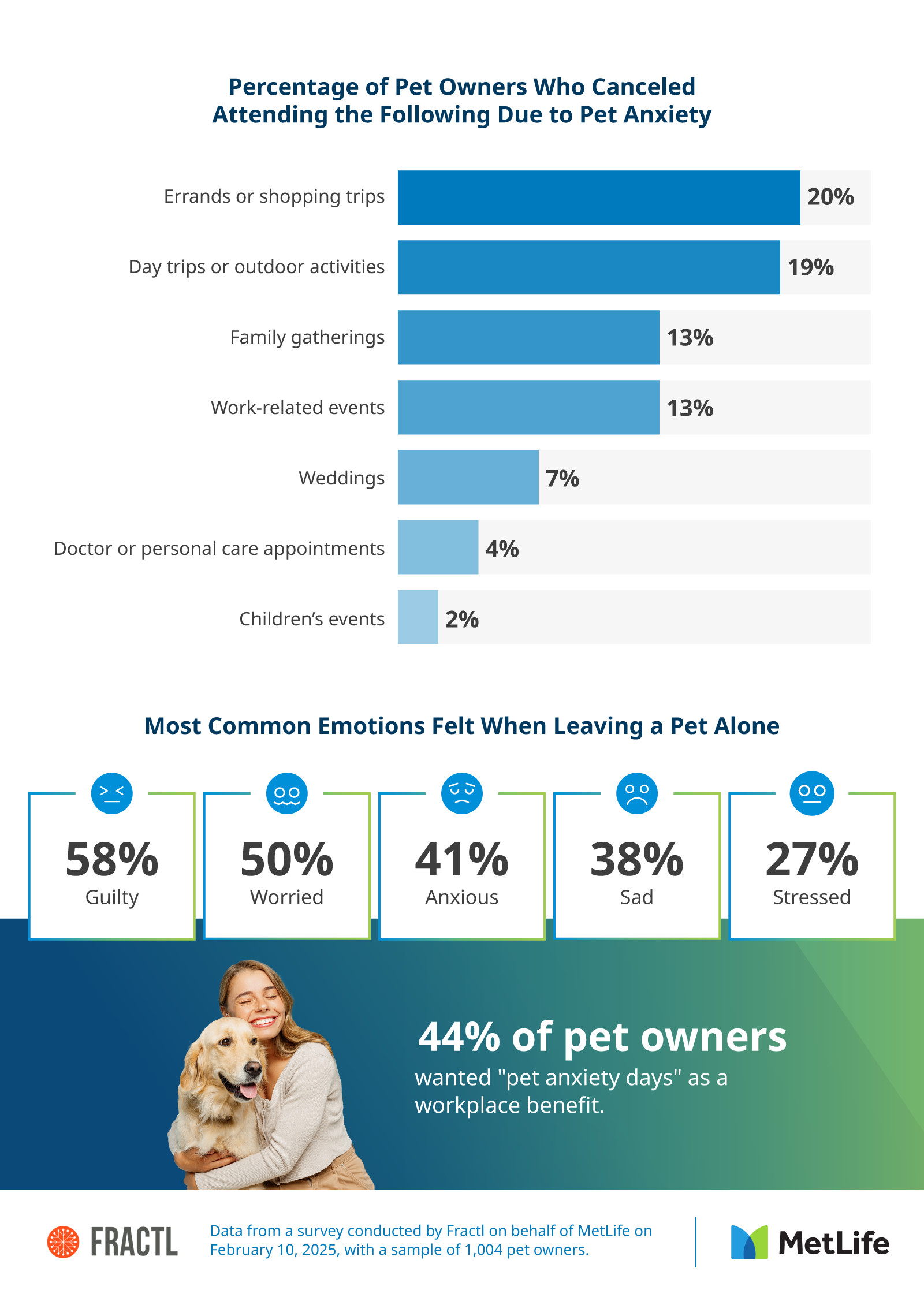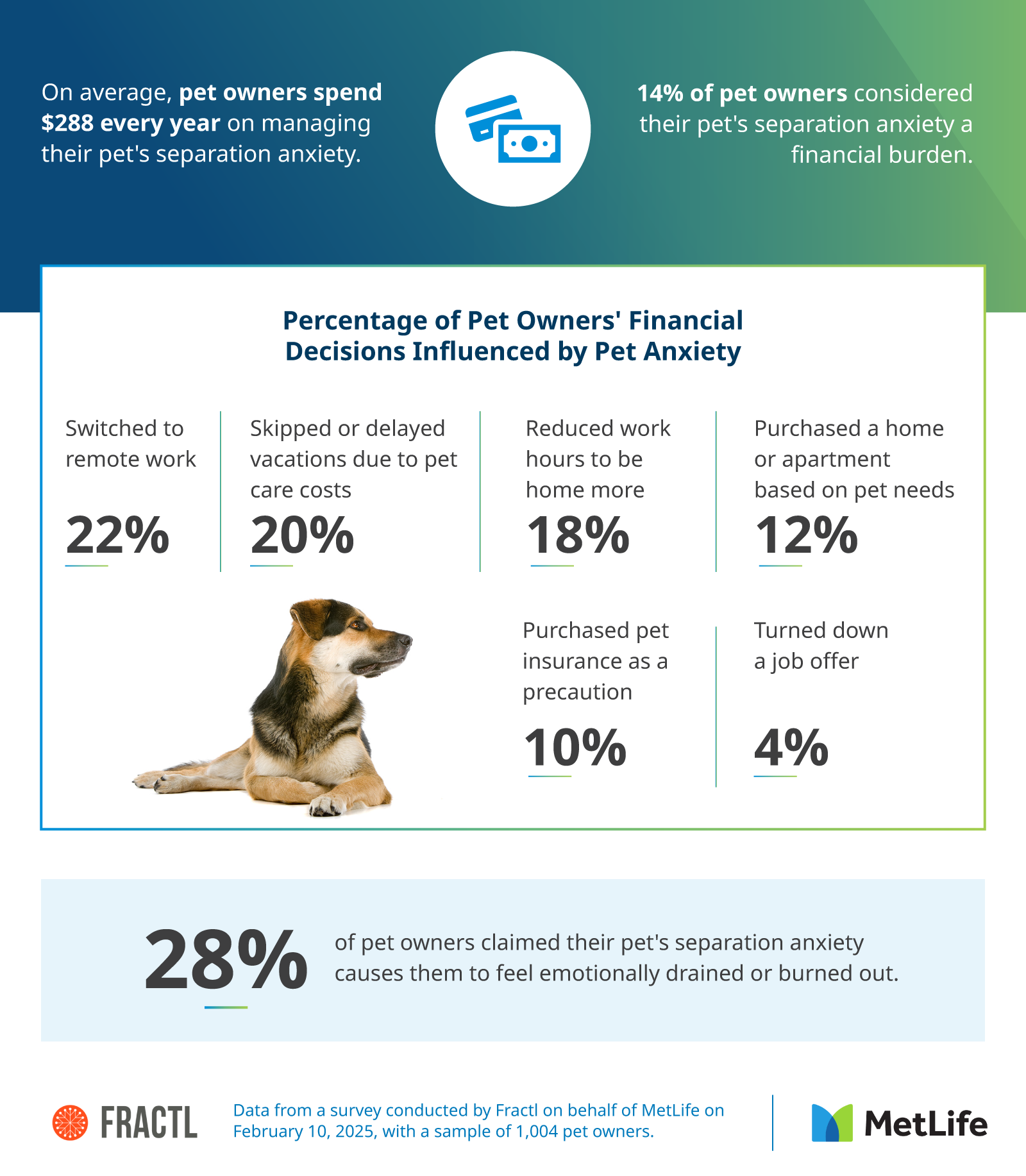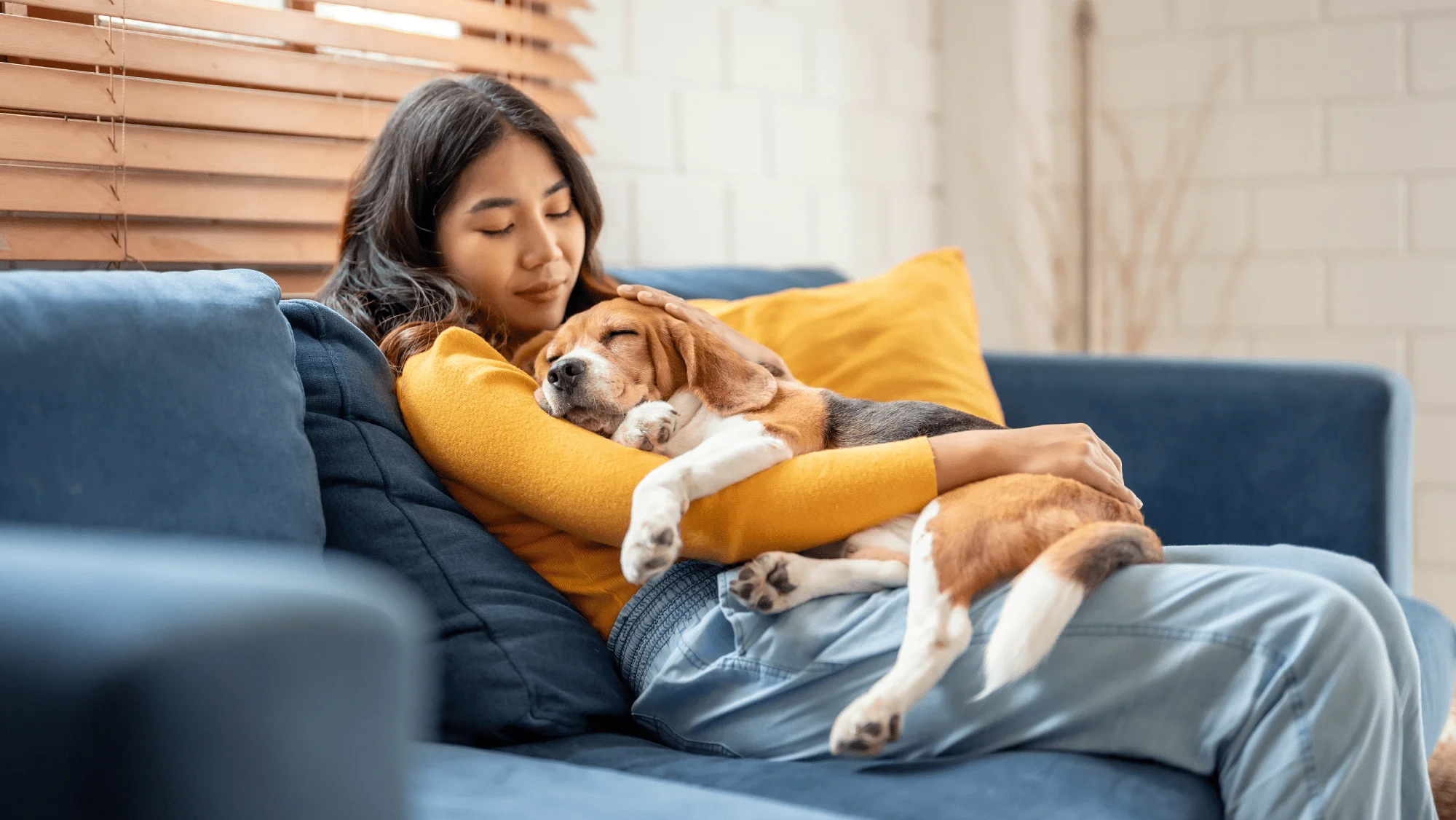PET INSURANCE
For many pets, being left alone is stressful — but it also takes a toll on owners. From adjusting work schedules to spending hundreds on anxiety relief, pet owners make significant sacrifices to keep their pets comfortable.
We surveyed 1,004 pet owners to understand how separation anxiety affects their lives emotionally, financially, and professionally. The findings highlight the lengths owners go to for their pets and how pet insurance can help address potential underlying health issues contributing to anxiety.
Key Takeaways
Nearly 9 in 10 pet owners (88%) have noticed signs of separation anxiety in their pets.
- 44% of pet owners want "pet anxiety days" as a workplace benefit.
- 14% consider their pet's separation anxiety a financial burden, with Gen Z being the most likely to feel this way (17%).
- Pet owners spend an average of $288 every year managing their pet's separation anxiety, with dog owners spending the most at $330.
- 29% of Gen Z pet owners have chosen remote work due to pet-related anxiety.
- 1 in 5 pet owners have delayed seeking medical care for their pet's anxiety due to financial concerns.
- 27% have consulted a veterinarian about whether a medical issue is contributing to their pet's anxiety; those with pet insurance were 48% more likely to do so.
The Emotional Toll of Pet Separation Anxiety
Leaving a pet alone can be a difficult experience for both owners and their furry companions. Many pet owners find themselves adjusting their lives to accommodate their pets' anxiety, while also struggling with their own feelings of guilt and worry.

Nearly 9 in 10 pet owners (88%) reported noticing signs of separation anxiety in their pets.1 Among dog owners, 30% observed these signs often or always. But the emotional strain isn't one-sided — 57% of pet owners admitted to experiencing separation anxiety themselves when away from their pets.
As a result, 39% of owners said they have come home early or taken breaks to check on their pet, while 31% have avoided or canceled social plans entirely to manage their pet's distress. Millennials were the most likely to sacrifice social plans, with 35% altering their schedules for their pets' well-being.

Beyond lifestyle adjustments, pet separation anxiety weighs heavily on owners' emotions. More than half (58%) reported feeling guilty when leaving a pet home alone, and Gen Z pet owners were the most likely to feel anxious about it (45%).2
This stress extends beyond personal feelings — 24% of owners said they have felt judged by others for making lifestyle changes to accommodate their pet's anxiety, and 17% even reported that their pet's distress has caused tension in their personal relationships.
Recognizing the widespread impact, 44% of pet owners expressed interest in workplace benefits such as "pet anxiety days" to help manage their pets' needs without compromising their own responsibilities.
How Pet Owners Manage Separation Anxiety
Pet owners are finding ways to ease their pets' separation anxiety, from purchasing special products to making lifestyle changes. These efforts can come with financial and professional sacrifices, as owners work to balance their responsibilities with their pets' well-being.

Many owners have turned to calming solutions to ease their pet's separation anxiety, with 32% using calming treats, 30% relying on interactive toys or puzzle feeders, and 26% investing in pet cameras or other monitoring devices.3 For some, daycare is a necessary expense — 12% of pet owners reported spending an average of $1,075 annually on pet daycare services.

On average, pet owners spend $288 each year managing their pet's separation anxiety, with dog owners spending the most at $330. For 14% of owners, these costs have become a financial burden, with Gen Z being the most likely to feel the strain (17%).
Beyond finances, pet-related anxiety has influenced career decisions: 22% of owners have opted for remote work to stay home with their pets, a choice most common among Gen Z (29%). Additionally, 4% of owners have turned down job opportunities due to their pet's anxiety, with millennials being the most likely to do so (5%).
The Link Between Pet Anxiety and Health Issues
Many pet owners suspect their pet's separation anxiety may stem from an underlying medical condition, making veterinary care an important step in addressing the issue. For those with financial concerns, pet insurance can be a valuable resource, helping owners seek care without hesitation.

More than a quarter of pet owners (27%) believed their pet's anxiety was linked to an undiagnosed health issue, while 14% said a known medical condition was contributing to their pet's distress. However, financial concerns sometimes created barriers — 1 in 5 reported delaying vet visits due to costs.
Pet insurance can helps make veterinary care more affordable. While 27% of pet owners have consulted a veterinarian to determine if a health issue is contributing to their pet's anxiety, those with pet insurance were 48% more likely to do so.4 Nearly half (47%) said having coverage made them more likely to seek care for anxiety-related concerns, reinforcing the value of pet insurance in helping owners address both behavioral and medical factors.
Balancing Care, Costs, and Confidence
Pet separation anxiety affects both pets and their owners, leading to emotional strain, lifestyle changes, and financial commitments. Many owners go to great lengths to ease their pet's distress, from adjusting work schedules to seeking veterinary care. With the potential for underlying health issues to contribute to anxiety, pet insurance can help owners afford the care their pets need while reducing the stress of unexpected costs.
Methodology
We surveyed 1,004 pet owners about their experiences with pet separation anxiety. Among the respondents, 668 owned a dog, 529 owned a cat, and 59 owned a different pet. The survey was conducted on February 10, 2025.
About MetLife
MetLife Pet Insurance offers coverage options to help pet owners manage the costs of veterinary care. With plans that fit various budgets and needs, pet insurance can help in case of covered events so your furry family can receive the care they deserve.
Fair Use Statement
This data is available for non-commercial use. Please ensure you link to this page when referencing it.

